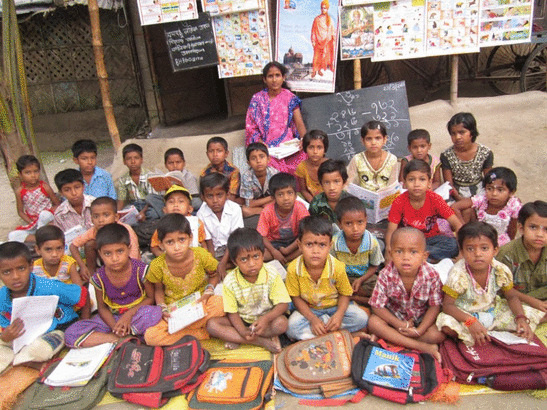– Arshad Shaikh
Ekal Vidyalaya is a movement that runs one-teacher schools (known as Ekal Vidyalayas) all over India. Their motto is to take education to every child in the remotest rural and tribal villages. Ekal claims to be the largest grassroots level non-governmental education and development movement that operates in the remote villages of India and Nepal. While the objectives of the Ekal movement are noble and laudable, there are reports that their schools are indoctrinating poor children regarding the Hindu religion.
Children attending Ekal Schools are exposed to Hindu religious practices and rituals. They are made to visit Hindu temples, sit on the temple floor, and focus their attention on Hindu deities. This exposure immerses them in Hindu religious environments. Regardless of their religious backgrounds, all students are required to chant Hindu prayers and mantras. This includes teachings that classify non-Hindus as “Adharmis” (unrighteous), reinforcing the idea of Hindu religious superiority.
The curriculum in Ekal Schools incorporates Hindu nationalist ideology. Textbooks contain narratives that depict Muslims forcefully converting Hindus to Islam, perpetuating a divisive and biased view of history. This narrative aligns with the agenda of radical Hindu organizations in India.
Some Ekal Schools teach children to correlate Hindu goddesses with the concept of India as a motherland, blurring the lines between Hinduism and nationalism. This further strengthens the association between Hinduism and Indian identity. Some students are inspired by their teachers’ teachings and join Hindu nationalist militant organizations such as the Bajrang Dal. This demonstrates how Ekal Schools can motivate children to adopt extremist ideologies.
Ekal Schools are presented as a free and attractive option for children from poor families. They offer amenities like computer labs, which can be a luxury in rural areas, to draw students in. This combination of free education and amenities can influence children and their families to accept the teachings, even if they don’t align with their religious beliefs.
In some instances, Muslim children attending Ekal Schools are encouraged to recite Hindu prayers, effectively encouraging them to give up their Islamic faith in exchange for a free education. Is this not a form of forced religious conversion in the garb of education?
Ekal Schools are using a combination of religious practices, biased curriculum, and economic incentives to indoctrinate poor children into adopting Hindu nationalist beliefs, promoting Hinduism as superior, and potentially marginalizing those who follow other religions.




